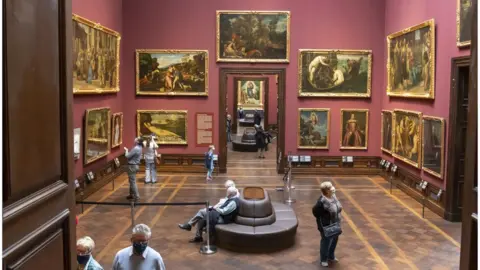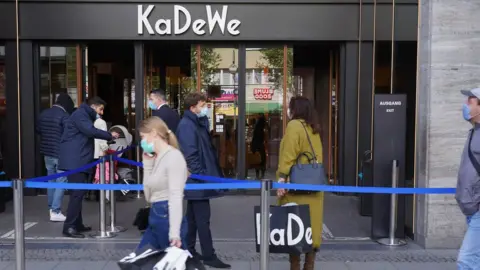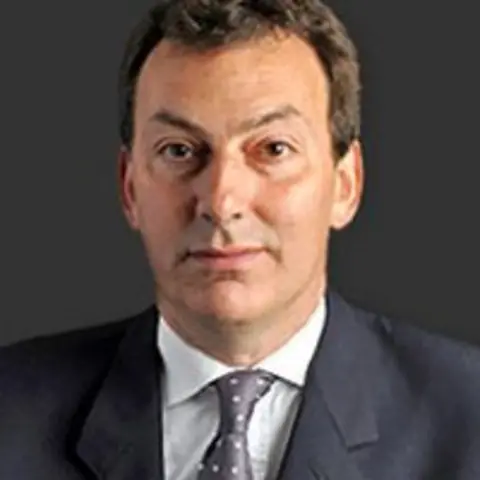German museums and shops open as lockdown eased
 Getty Images
Getty ImagesIn Germany coronavirus restrictions are being softened - and at a dizzying rate.
As yet this has caused no resurgence of the virus.
Cabinet minister Peter Altmaier told us in a Newsnight interview there had been "a decline in infections, for now, at least four weeks in a row".
Noting that there is no German word for "serendipity", Professor Robert Kaufman of the Max Planck Institute for Infection Biology said: "We apparently did not have hotspots, it spread slowly and we were lucky."
Applying its large-scale testing capability and tracing of thousands of early cases, Germany contained its infection at a relatively low level.
So now restrictions are being relaxed. Religious services resumed on Sunday, many shops were able to reopen on Monday, some museums will follow on Wednesday - as well as cabinet decisions about further easing of the rules.
Mr Altmaier, the economy minister and a long-time political ally of Chancellor Angela Merkel, told us that 75% of businesses had never closed, and that they were proceeding with caution while keeping a careful eye on infection rates, since having to re-impose controls could have a "disastrous effect on the economy".
If this strategy proves successful, Germany will suffer far less harmful effects from the pandemic in economic terms, as well as loss of life, compared with Italy, Spain, or the UK.
Filming in Berlin in recent days, it appears markedly more "open" than central London.
However, rules have been put in place for people to wear masks on public transport, in shops and public buildings.
Social distancing is also applied, although in this country, since the outset, people have been asked to remain 1.5m apart rather than the 2m practised elsewhere in Europe.
It is also apparent here that contact tracing is being applied at many levels.
We have been asked to provide our names and phone numbers at venues from our hotel, to a government ministry, a museum, and a Catholic church where we filmed Mass.
So even if the planned phone app for tracing does not achieve widespread use, more rudimentary systems are already in place.
There are of course some key steps that have not been taken yet.
Schools and universities will open gradually, while bars and restaurants could remain shut for many weeks yet.
The government is looking at how to allow extended families or small numbers of friends to meet.
It would be wrong to say that liberalisation of these controls has happened without friction in Germany's usual consensus-based politics.
But the issues have normally arisen from those wanting to move at a faster pace.
Some big department stores took legal action to ensure that they too could open on Monday, the measure having initially been aimed at smaller businesses.
 Getty Images
Getty ImagesChurch groups also challenged the earlier ban on services in court.
Overall though, public acceptance for the government's chosen path seems to be widespread.
Chancellor Merkel's party has risen in the polls, and there seems to be no serious debate about mask wearing, distancing by 1.5m rather than 2m, or reopening so many businesses.
When I asked Prof Kaufman, one of the country's leading virologists, about the government's apparent confidence in its chosen path he noted the importance of the relatively low death rate (about 7,000 at the time of writing).
"That's the very strong point", he observed. "People feel and are confident we can return to normal life."
This afternoon we went out to Potsdam, to the Museum Barberini, which is reopening on Wednesday, having paused a major Monet exhibition because of the outbreak.
Ortrud Westheider, the director, explained the new restrictions to me. The number of visitors will be cut by two-thirds, masks will be worn, and a one-way system will be followed around the exhibition.
"We will be able to ensure that people see it in the way we intended," he said, noting an unexpected benefit from the new regime.
It is remarkable though that while harder-hit European countries are still agonising about the most basic changes to their lockdown rules, Germany has progressed to the point where high culture can again be accessed by the public.
You can watch Newsnight on BBC Two at 22:45 on weekdays. Catch up on iPlayer, subscribe to the programme on YouTube and follow it on Twitter
